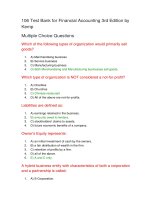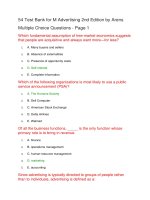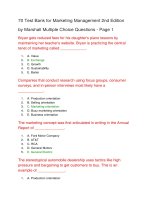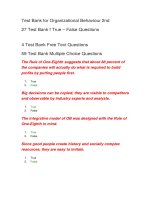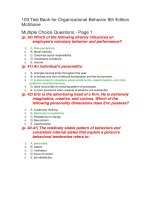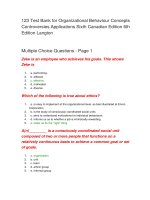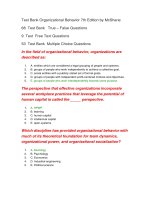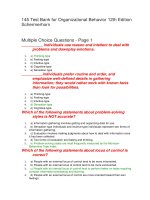Test bank for organizational behaviour 2nd edition french multiple đề thi trắc nghiệm
Bạn đang xem bản rút gọn của tài liệu. Xem và tải ngay bản đầy đủ của tài liệu tại đây (78.47 KB, 15 trang )
Test Bank for Organizational Behaviour 2nd Edition
French Multiple
Multiple Choice Questions
In response to others, ‘internals’:
1.
a. are more reliant on their own judgement
2.
b. are less reliant on their own judgement
3.
c. have less self-control
4.
d. are more rigid
Simon also promoted Moira. Simon assumes that because Moira is polite,
punctual and neat she must also be a dedicated and diligent worker. This
is an example of:
1.
a. stereotyping
2.
b. the halo effect
3.
c. selective perception
4.
d. expectancy
A person’s perceptual set is:
1.
2.
3.
4.
a. when one attribute of a person or situation is used to develop an overall
impression
b. the assignment of one’s own personal attributes to other individuals
c. the tendency to find in another situation or person that which you expected to
find
d. a person’s past experiences, personality and values influencing their perception
Which of the following is NOT included as a major factor contributing to
perceptual differences?
1.
a. characteristics of perceiver
2.
b. characteristics of perceived
3.
c. situation
4.
d. motivation
A halo effect occurs when:
1.
a. an individual is assigned to a group or category and judged accordingly
2.
b. one attribute of a person or situation is used to develop an overall impression
3.
c. one assigns one’s own personal attributes to another individual
4.
d. an individual overestimates the influence of personal factors on others’
behaviour
Roman always uses whatever means, foul or fair, in order to please his
manager. He upsets many people in the process of doing so. Roman is
demonstrating:
1.
a. stereotyping
2.
b. Machiavellianism
3.
c. selective perception
4.
d. authoritarianism
Work effort is best described as:
1.
a. willingness to turn up to work
2.
b. willingness to work long hours
3.
c. willingness to perform
4.
d. motivation to work
The idiographic approach to personality:
1.
a. believes that an individual’s personality emerges and develops with experience
2.
b. believes that one should do whatever it takes to get our own way
3.
c. seeks to identify the ways in which individual’s personality varies from others
4.
d. believes that extroversion-introversion is the most important personality
dimension
Cognitive dissonance occurs when:
1.
a. an individual experiences a feeling of dissatisfaction with their work
2.
b. an individual experiences a feeling of dissatisfaction with their employer
3.
c. there is a state of consistency between an individual’s attitudes and behaviour
4.
d. there is a state of inconsistency between an individual’s attitudes and behaviour
Impression management is:
1.
a. the assignment of an individual to a group or category and judging them
accordingly
2.
b. the assignment of our own personal attributes to another individual
3.
c. an attempt to behave in ways that will create and maintain desired impressions
4.
d. an overestimation of the influence of personal factors on other’s behaviour
The individual performance equation comprises:
1.
a. individual attributes, organizational support and work effort
2.
b. work effort, personal goals and organizational support
3.
c. individual attributes, organizational support and personal goals
4.
d. personal goals, work effort and individual attributes
Kyla always blames others when things go wrong. This is an example of:
1.
a. an internal locus of control
2.
b. an external locus of control
3.
c. external dogmatism
4.
d. a manipulative tendency
Which of these statements is correct?
1.
a. cultural self-awareness is a pre-requisite for understanding other cultures
2.
b. cultural self-awareness is a hindrance to understanding other cultures
3.
c. cultural self-awareness was a term coined by Rotter
4.
d. cultural self-awareness was a term coined by Machiavelli
Which of these statements is correct?
1.
a. stereotypes are not always inaccurate
2.
b. stereotypes are always accurate
3.
c. stereotypes are always inaccurate
4.
d. stereotypes are always the result of culture shock
Internals are __________ than externals.
1.
a. more alienated
2.
b. more rootless
3.
c. better in learning and problem solving tasks
4.
d. more dependent
In a recent job review Simon promoted Fraser because he thinks Fraser
shows the same drive that he had when he was Fraser’s age. This is an
example of:
1.
a. stereotyping
2.
b. the rusty halo effect
3.
c. projection
4.
d. cognitive dissonance
The ‘rusty halo’ effect involves:
1.
a. one attribute of a person or situation leading to a negative overall impression
2.
b. one attribute of a person or situation leading to a positive overall impression
3.
c. the tendency to find in another situation or person that which you expected to
find
4.
d. the assignment of an individual to a group or category and judging them
accordingly
Ian and Lars are working hard and to the best of their abilities, but are still
not achieving the high performance levels expected of them. This is
because there may be:
1.
a. a lack of organizational support
2.
b. an improper allocation of rewards
3.
c. low motivation
4.
d. rusty halo effect
Samantha is a 29-year-old sales consultant for a podcasting company.
She believes that she can accomplish anything she wishes to, and always
takes action to improve her circumstances. However her manager is
reluctant to send her on an overseas assignment as he believes women
managers would not be accepted in the host country in question Which
one of the following concepts is relevant in Samantha’s story?
1.
a. introversion
2.
b. heredity
3.
c. stereotyping
4.
d. psychodynamic theory
Stereotyping is:
1.
a. assigning an individual to a group or a category and judging the person
accordingly
2.
b. overestimating capabilities of a group
3.
c. underestimating capabilities of a group
4.
d. treating every individual the same way
Value congruence occurs when:
1.
a. individuals express positive feelings on encountering others with similar values
2.
3.
4.
b. individuals express negative feelings on encountering others with similar values
c. an individual experiences a state of inconsistency between their values and
behaviour
d. an individual changes their future behaviour to align with their values
Cindy and Roberta were watching a game of tennis. The referee called
‘out’ – but Cindy disagreed with the call. However, Roberta agreed with
the referee’s decision. This is an example of:
1.
a. stereotyping
2.
b. negotiating
3.
c. perception
4.
d. psychometric testing
The locus of control measures:
1.
a. the ways in which a person goes about gathering and evaluating information
2.
b. a person’s emphasis on authority
3.
c. the extent to which a person feels able to affect his or her life
4.
d. the relatively enduring ways in which one individual differs from another
Externals are __________ than internals.
1.
a. less dogmatic
2.
b. less authoritarian
3.
c. less Machiavellian
4.
d. less reliant on their judgement
What is NOT part of the performance equation?
1.
a. satisfaction causes performance
2.
b. motivation causes performance
3.
c. motivation causes satisfaction
4.
d. rewards cause both performance and satisfaction
Which of these statements is correct?
1.
a. culture shock does not involve a re-evaluation of core values
2.
b. culture shock necessarily involves re-evaluation of core values
3.
c. culture shock is experienced more by females than by males
4.
d. culture shock is experienced more by males than by females
Which of these statements is correct?
1.
a. values are more specific than attitudes
2.
b. attitudes are more positive than values
3.
c. values are less specific than attitudes
4.
d. attitudes are more negative than values
Which of the following is not one of the ‘Big 5’ personality dimensions?
1.
a. extroversion-introversion
2.
b. agreeableness-hostility
3.
c. halo-rusty halo
4.
d. open to experience-closed to experience
The use of stereotyping in judging people results in:
1.
a. correct evaluation of differences between individuals
2.
b. correctly identifying characteristics of a group
3.
c. accurate prediction of job performance
4.
d. inaccurate assessment of an individual’s performance potential
Dudley is a 64 year-old man who has done just about every job there is to
do in the organization and is able to fill in for most employees when they
are absent from work. Despite this, he lacks confidence, has a poor
opinion of himself and keeps to himself as much as possible. Which
personality traits best describe Dudley?
1.
a. Internal locus of control and poor self-concept
2.
b. Introverted and high in self-esteem
3.
c. High self-esteem and external locus of control
4.
d. Introverted and low in self-esteem
Projection is:
1.
a. the assignment of one’s own personal attributes to other individuals
2.
b. the tendency to find in another situation or person that which you expected to
find
3.
c. when one attribute of a person or situation is used to develop an overall
impression
4.
d. assigning an individual to a group or category and judging the person
accordingly
Meglino’s values schema consists of:
1.
a. empathy, helping and concern for others, honesty and fairness
2.
b. achievement, helping and concern for others, honesty and fairness
3.
c. empathy, achievement, honesty and fairness
4.
d. honesty, helping and concern for others, fairness, integrity
The nomothetic view of personality:
1.
a. believes that an individual’s personality emerges and develops with experience
2.
b. seeks to identify the ways in which individuals’ personality varies from others
3.
c. gives stress to an individual’s childhood experience in determining personality
4.
d. believes that we behave in ways that create and maintain desired impressions
The locus of control was developed by:
1.
a. Pygmalion
2.
b. Mintzberg
3.
c. Rotter
4.
d. Freud
The fundamental attribution error occurs when:
1.
a. we overestimate the influence of personal factors on others’ behaviour
2.
b. we assign an individual to a group of category and judge them accordingly
3.
c. we assign our own personal attributes to another individual
4.
d. we behave in ways that will create and maintain desired impressions
Dogmatic superiors tend to:
1.
2.
a. reject authority
b. accept subordinates based on how much the subordinates agree with accepted
authority
3.
c. alternate between being rigid and flexible
4.
d. use a flexible approach as managers
‘The Prince’ is the basis of a personality dimension called:
1.
a. dogmatism
2.
b. Machiavellianism
3.
c. authoritarianism
4.
d. extroversion
Emily has developed a negative feeling towards her supervisor over a
period of time, but she is not sure what to do about it. At what stage of
attitude formation is she?
1.
a. cognitive
2.
b. affective
3.
c. perceptive
4.
d. behavioural
Felipe is a young man who appears very sensitive to the other employees’
moods and concerns. He is outgoing and always happy to have lots of
company and social time with work colleagues. Which of the following
pairs of concepts best describe Felipe?
1.
a. extroversion, emotional intelligence
2.
b. introversion, emotional intelligence
3.
c. Machiavellianism, emotional intelligence
4.
d. closed to experience, emotional intelligence
Which of the following is not an advantage of employing a diverse
workforce?
1.
a. diverse perspectives bring creativity and innovation
2.
b. where there is a shortage of skilled labour, diversity has recruitment benefits
3.
c. problems are solved using a wide range of ideas and perspectives
4.
d. in diverse workforces individual are stereotyped
True - False Questions
Cognitive dissonance is not a state of perceived inconsistency between a
person’s expressed attitude and his or her actual behaviour.
1.
True
2.
False
Dogmatism is a personality trait that focuses on a rigidity of a person’s
beliefs.
1.
True
2.
False
One of the components of the individual performance equation is
organizational support.
1.
True
2.
False
A script schema is a framework that describes the appropriate sequence
of events in a given situation.
1.
True
2.
False
People with an internal orientation believe that they control their own fate
or destiny.
1.
True
2.
False
Psychodynamic theories of personality believe that it is composed of
thoughts and drives emanating from the unconscious.
1.
True
2.
False
Examples of individual attributes are demography, personality and
competency.
1.
True
2.
False
The affective component of an attitude is a specific feeling regarding
personal impact.
1.
True
2.
False
Culture shock is commonly experienced by global managers.
1.
True
2.
False
Cultural values and norms do not play a substantial role in the
development of an individual’s personality and behaviours.
1.
True
2.
False
Locus of control measures the internal-external orientation of a person.
1.
True
2.
False
Personality is the overall profile or combination of traits that characterise
the unique nature of a person.
1.
True
2.
False
No one perception is ‘right’ in any objective sense and the ways in which
we view the world can be influenced by our cultural background.
1.
True
2.
False
Perception is the process by which people select, organize, interpret,
retrieve and respond to information from the world around them.
1.
True
2.
False
Older people tend to be inflexible.
1.
True
2.
False
The cognitive component of an attitude consists of the beliefs, opinions,
knowledge and information a person possesses.
1.
True
2.
False
A Machiavellian is someone who views and manipulates others purely for
personal gain.
1.
True
2.
False
People’s values develop as a product of the learning and experiences they
encounter in the cultural setting in which they live.
1.
True
2.
False
In order to deal effectively with people from other cultures it is necessary
to understand the influence of one’s own culture.
1.
True
2.
False
Situational constraints refer to the forces within an individual that account
for the level, direction and persistence of effort expended at work.
1.
True
2.
False
Free Text Questions
Why might a short business presentation such as we see in Dragons’ Den
or a job interview not be a good predictor of subsequent performance?
Answer Given
• Essentially these are artificial situations where it would be easy to make
inaccurate judgements based on perception; • Performance to be understood with
regard to the complete performance equation; • Managers must recognise
individual differences in order to maximise organizational effectiveness. This takes
time.
Outline the performance equation and its components.
Answer Given
This equation set out a relationship between individual attributes, work effort and
organizational support. All are deemed to be necessary to ensure desired
performance levels.
What is perception? Describe the role that perception plays in
management.
Answer Given
• Perception is the process through which people receive, organise and interpret
information from their environment; • Perception is not necessarily the same as
reality; • The characteristics of the perceiver, the setting and the perceived must
always be taken into consideration; Examples of above characteristics; • The
perceiver might have a negative attitude towards others; • The setting — it may be
acceptable to call your boss by her first name in Denmark but not in Malaysia;•
The perceived — a person perceived as unusual in whatever respect will stand
out more than an ‘average’ person.
What do you understand by the terms ‘halo’ and ‘rusty halo’ effect. Give
two examples to demonstrate your understanding.
Answer Given
This occurs when one key attribute of a person is used to develop an overall
impression of a person or situation. The terms halo and rusty halo relate to when
such attributes are perceived in a positive or negative light respectively.
What are some of the situational constraints that may not allow workers to
perform adequately? Give reasons for your answers.
Answer Given
Examples might include: • Lack of time; • Inadequate budgets; • Inadequate tools
and equipment; • Insufficient/inadequate instructions; • Unfair levels of expected
performance; • Inflexibility of procedures.
Explain any differences and similarities between authoritarianism and
dogmatism.
Answer Given
Both deal with the rigidity of a person’s beliefs although these may take different
forms. Dogmatism thus may not necessarily relate to issues of authority.
Explain locus of control and the different work outcomes that might relate
to each of the orientations in that theory.
Answer Given
This refers to the general conceptions people have concerning whether events are
controlled primarily by themselves as opposed to which they are determined
externally.
Explain the concept of perceptual set and give an example to demonstrate
your understanding.
Answer Given
Characteristics of a person e.g. their past experiences, motives, personality,
values and attitudes as these affect the perceptual process.

